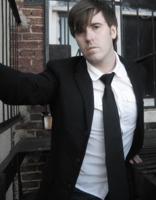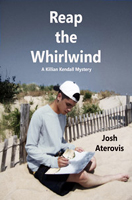 |
An Interview with: Josh Aterovis
Josh Aterovis is the author of the award-winning Killian Kendall Mystery Series. Aterovis's first two books, Bleeding Hearts and a spin-off mystery Reap the Whirlwind , were first published in 2001 and 2003 respectively. The first book, Bleeding Hearts , introduced gay teen sleuth Killian Kendall, and won several awards, including the 2002 Whodunit Award from the StoneWall Society. He followed up by winning the Whodunit Award again the following year for Reap the Whirlwind . The two books were republished by PD Publishing in 2008, once again garnering glowing reviews. His latest book, All Lost Things , was released in October of 2009, and was recently named a finalist for a Lambda Literary Award for Gay Mystery. In addition to novels, Aterovis also writes for AfterElton.com, an entertainment news website owned by MTV's LOGO network for and about gay and bisexual men, and for Baltimore OUTloud. Aterovis was born and raised on the Eastern Shore of Maryland, where his books are set. He now lives in Baltimore, MD. You can visit his website at www.joshaterovis.com. What is your writing method? Lots of planning, no planning, etc. Mystery books have to be fairly well-plotted so I spend a lot of time creating an outline. I think of the outline a very flexible skeleton. It lays out the pacing for my main mystery, but also for my subplots, so everything weaves together nicely and wraps up about the same time. That doesn't mean I don't make plenty of changes as I go. The characters still have minds of their own and will demand I go somewhere I hadn't planned. When that happens, I usually stop and rework the outline from that point on, just to keep everything up-to-date and properly paced. I probably rework the outline anywhere from eight to a dozen times or more in the course of a first draft. I'm also a very linear writer. I start with the first page of the book and write directly through as if I was reading the book. I outline the same way. I don't jump around or get random scenes and then work it out later like a jigsaw puzzle, but I'm fascinated by writers who work that way.
Where is your favorite place to write? Always in my office space, wherever that may be at the time. I'm not a café writer. I'm too easily distracted. I can edit around people or with other things going on, but I pretty much need solitude for my creative process. When is your favorite time of day to write? Definitely in the afternoon and evening. I'm not a morning person at all. Luckily, neither is my muse. My word fairy doesn't even tap on my door until after lunch. Describe your writing space. Right now, it's part of my bedroom, which is more or less my retreat from life. It's nothing fancy. Just my desk with my computer. Where do you go to work when you want to escape from your usual surroundings? I don't. I don't have a laptop, so I work in my writing space or not at all. I often take walks when I need to think through a scene though. I do a lot of my writing in my head before I ever touch the keyboard. What are the five most distracting things when you're working? Noise of any kind pretty much takes up all five spots. It doesn't matter if it's people talking nearby, clattering around the house, TV in another room, music with lyrics... It's pretty bad. Like I said, I need no distractions and almost total solitude. I can have classical music playing in the background, but that's about it.
What do you consider your two writing strengths and your two writing weaknesses? I've been told I'm good at creating realistic characters: people who are flawed but you like them anyway. I often hear that my characters feel like friends, which is just about the highest compliment I can be paid. People have also said I write realistic dialogue, so I suppose those would be my strengths. My weakness, huh? The thing I get critiqued for the most is that my characters are too emotional. I'm a pretty emotional person — though less so as I get older — so I've never quite understood that particular criticism, but I hear it over and over so it's something a lot of people believe. I also stink at commas. After all these years, I still only have the vaguest idea of where they should and shouldn't go — especially since it seems like every editor I work with has his or her own ideas of proper comma usage. I don't even argue. I remove the ones they don't like and insert the ones they do. What three habits interfere with your work on a regular basis? Again, all three answers could be summed up in one: the Internet! Email is my worst distraction. I am addicted to my email. Now I can even check it on my phone. That was an unhealthy step for me. It's like an alcoholic carrying a portable bar around with them. [laughs] Gchat is also dangerous for me, as is Facebook. I've also been known to jump online to do some quick research, and, two hours later, realize I've been watching videos on YouTube for the last hour and a half. What is it that kick starts a project for you: a character, a situation, or…? Since I write a series, I have my main characters already, so it's usually a situation. I come up with the central mystery for the next book and everything builds from there. I usually the subplots, Killian and his friends and family's personal lives, in mind before I have the mystery. I have a general idea of the overarching story I want to tell with Killian . How long does it generally take you to complete a novel – from conception to completion? I'd say generally a year for the first draft, give or take a few months. Outlining alone can take me a month or two. That's when I really hash-out the story — not all the details and dialogue and action, but the general plot. How long the actual writing process takes depends on what's going on in my life at the time. If I can stay focused and write every day like I should, it goes pretty quickly, although not as quickly as some of my friends who can crank out three or four books a year. I'm always amazed by that amount of productivity! How many revisions do you normally go through when writing a novel? Are we counting outline revisions? Like I said, I revise the outline numerous times throughout the process of writing the rough draft. Then I usually do at least one major revision of the rough draft, before the manuscript gets the final polish of several rounds of editing. Have you ever thought about casting your novel as a movie? Who would you like to play your characters and why? I get asked this a lot, and to be honest, I stink at this game. I never really have actors in mind when I think about my characters. There is one exception. I've always wanted Robert Gant to play Adam. He looks a lot like how I picture the character, but more importantly, he really just has the right vibe. I have no idea who I'd want to play Killian. I liked Hunter Parish in It's Complicated . He could probably work. Or maybe Zac Efron, but...can he really act? I'd almost rather an unknown played him. How important is the book cover for sales, etc.? You know, I've never quite figured this one out. I did paintings for the covers of the original editions of Bleeding Hearts and Reap the Whirlwind . When they were re-published by PD, I switched to photography. I love the new covers, but I often hear from people who prefer the original covers. I would have thought pretty guys on the front would sell better than a watercolor painting of flowers — and maybe they do for my target audience. I really don't have an answer to that. How important is the title of a book? Is it easy for you to come up with titles? I usually have a title before I ever start writing. Sometimes, I have a title before I even have a story. Years ago, I was watching Jeopardy , and one of the answers was "What is 'reap the whirlwind'?" I remember thinking, "That would be a great book title, but what would it be about?" I couldn't get it out of my head. I started thinking, and since it's a quote from the Bible, I decided it would be about a preacher's kid struggling with being gay. That's how Reap the Whirlwind came to be. Obviously, it evolved from that initial inkling of an idea, but that was the process. I think titles set the tone for the story, so I think they're really important. What makes mystery a popular genre? Why do you think people like it? I think people like the aspect of figuring out whodunit. They like trying to outwit the sleuth, figure it out before he does. It's all about the puzzle. Of course, my books are very character driven, so the central plot isn't always the be-all, end-all. Is there a subject you are sure to stay away from in your writing? Not really. I've already tackled child abuse, the sex industry, religion, sexual abuse, the metaphysical... My books have been labeled Young Adult, and I can see why, but I definitely don't shy away from challenging subject matter. I can't think of anything that I'd want to avoid. I write murder mysteries, for God's sake. Just by their very nature, I'm already dealing with the seamy underbelly of society. People don't usually kill for nice reasons. These aren't cozies. [laughs] What is the most difficult kind of character for you to create? Nice guys. [laughs] I find them kind of dull. I used to do polls on my website, and one time I asked who my readers' favorite character was out of all my books. The character Aidan in Reap the Whirlwind won by a landslide, but I think he's the most boring character I've ever created. I like complicated, flawed characters. The villains are fascinating for me — getting into their head to figure out why they did what they did. How did they justify their actions? How does it become okay to them to do what they did? And I love Killian. He's so far from perfect, but underneath everything, he's such a good person. I find him endless fascinating. If he was too nice or too perfect, I don't think I could write an entire series around him. I'd get too bored with him. What's your favorite mystery movie? I think Clue . I'm such a huge Madeleine Kahn fan. "Flame... flames... flames on the side of my face, breathing, breath... heaving breaths... heaving..." I also think Sixth Sense was a great mystery movie at heart. I'll never forget how completely blown away I was by the ending the first time I watched it. That's the feeling every mystery writer is going for with every book. If you ever did a cross-genre book, what would be your choice to mix with mystery (Science Fiction, Fantasy, Romance, Historical, etc.)? Well, I suppose technically I've already written a cross-genre book. All Lost Things has strong supernatural elements with a ghost story subplot and Killian discovering he has psychic abilities, so that could be considered urban fantasy, or at least speculative fiction. If I was going to write another, I'd probably stick to the fantasy genre. I love fantasy novels. I just don't have the time or patience to do all the world-building a true fantasy novel requires. Do you blog? If so, why and what do you usually blog about? I have a blog on my MySpace page, but I don't blog regularly. I mainly use it for updates about what's going on professionally, and to post Single Black Sheep, the relationship column I write for OUTloud. Have you ever done a blog book tour? What was that like and would you do it again? I haven't, but I think I'd be open to it if time allowed. Do you enjoy doing promotion? I actually do. I love talking to people about my books, introducing people to my characters, and I especially love hearing from fans. What's the strangest fan question/request you've ever gotten? I get invited places a lot. I get offered free plane tickets if I go visit them or go on vacation with them. While I'm sure those offers are made with the best of intentions (or I like to think so anyway), it doesn't change the fact that just because you've read my book or even exchanged a few emails with me, I don't really know you, and that comes across as a little creepy. I've seen Misery . [laughs] How have you grown as a writer? What has gotten better? I think my writing has just improved all around. I went back and read my original draft of Bleeding Hearts not too long ago, and I was shocked how far I'd come, just how much my writing had matured. I was actually able to rewrite Bleeding Hearts when it was republished in 2007. I was extremely grateful for the opportunity to clean up some of the mistakes I'd made eight years earlier and add in some things it really needed to be a stronger book. What things have you dropped along the way? Killian is less of a crybaby now. [laughs] I also dropped a husband. I've yet to see how that will affect my writing since I haven't started a new novel yet since my divorce. It will certainly make Killian's dating life more realistic. [laughs] What helped most in your growth as a writer? Good editors. I've worked with some great people who really care about my stories and my characters, and they've helped shape me into the writer I am today. And just life in general. I think good fiction come from life. I'm not writing autobiographies, but the more life I experience, the richer my stories will become. What is the “naughtiest” or most evil thing you've done in a novel? Besides killing people? [laughs] I suppose some people might consider sex naughty, but I'm a big fan of the fade-to-black style of love scenes. A lot of people thought the unexpected death of a major character in one of my books was pretty evil. Does that count? Respond to these pairings and tell why you respond the way you do: Series or stand-alone books Series. I love the chance to explore a character's personal growth and evolution throughout a series. Killian isn't static like Nancy Drew or Kinsey Millhone, who stay the same age and don't really change throughout dozens of books. Killian ages and matures with each installment of the series. Outlines or find-your-way plotting I guess my process is a bit of both. Like I said, I outline, but it's not set in stone. I still allow the characters to tell me where they want to go and what they want to do. Of course, I say "allow," and they laugh at me. We all know who's really in charge... Lots of research or make it all up Research, research, research. Never, ever make it up. Someone out there will know if you screw something up, and they will call you on it, and then you've lost people's respect. I spent over a year doing research on local Native American tribes and archaeologists for my fifth novel. I'm not saying I got it perfect, and I may have taken some creative license here and there, but I tried to make it as accurate as possible. Neat or sloppy Neat. I'm not a neat freak, but I can't stand sloppy. I actually work well with a little clutter, but I need to know where everything is within that clutter. I don't like it when my surroundings get too messy, though. NY or DC Depends. I like both for what they are, but would never want to live in either. I've grown up close to DC and spent a lot of time there, so I have a soft spot for it — especially its museums — but it's a political city through and through. I've only been to New York a few times, and haven't fully explored it by any stretch, but I always find it somewhat claustrophobic. And I know it's a cliché, but it stinks. [laughs] I like my cities a little more blue collar — like Chicago and Baltimore. I love how quirky and unique Baltimore is. I never considered myself a city boy, but I've loved living here. Carnivore or vegetarian I love vegetable, but I'm a carnivore, for sure. I love meat too much to ever give it up. |
|
|
Past issues and stories
pre 2005.
Subscribe to our mailing
list for announcements.
Submit your work.
Advertise with us.
Contact us.
Forums, blogs, fan clubs,
and more.
About Mysterical-E.
Listen online or download
to go.
|
|
|
 |
 |





